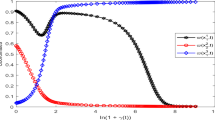Abstract
We prove that positive recursive general quitting games, which are quitting games in which (a) each player has a single quitting action and possibly several continue actions, (b) the stage payoff as long as quitting does not occur is 0, and (c) the payoff when quitting occurs is non-negative, admit a sunspot \(\varepsilon \)-equilibrium, for every \(\varepsilon > 0\).


Similar content being viewed by others
Notes
Note that since \(\mathrm{\mathbf{P}}_{{\widehat{\xi }}}(t_* < \infty ) = 1\), the payoff \(\gamma _{\alpha ,r}^E({\widehat{\xi }})\) is independent of r, the payoff if quitting does not occur.
The fact that the auxiliary quitting game \(\Gamma _{s,r}\) admits stationary 0-equilibria for every \(s \in [0,1]\) is due to a careful choice of the payoff function. In general, stationary 0-equilibria need not exist in all auxiliary quitting games.
For the definition of Q-matrices see Remark 3.
References
Browder F (1960) On continuity of fixed points under deformation of continuous mappings. Summa Bras Math 4:183–191
Flesch J, Thuijsman F, Vrieze OJ (1997) Cyclic Markov equilibrium in stochastic games. Int J Game Theory 26:303–314
Govindan S, Wilson R (2009) Global Newton method for stochastic games. J Econ Theory 144:414–421
Harsanyi JC, Selten R (1988) A general theorem of equilibrium selection in games. The MIT Press, Cambridge
Herings J-J, Peeters R (2004) Stationary equilibria in stochastic games: structure, selection, and computation. J Econ Theory 118:32–60
Mertens JF (1989) Stable equilibria: a reformulation part I. Definition and basic properties. Math Oper Res 14(4):575–625
Mertens JF, Neyman A (1981) Stochastic games. Int J Game Theory 10:53–66
Mertens JF, Sorin S, Zamir S (2015) Repeated games. Cambridge University Press, Cambridge
Munk O (2019) Sunspot equilibrium in absorbing games. M.Sc thesis. Tel Aviv University
Nash J (1951) Non-cooperative games. Ann Math 54(2):286–295
Simon RS (2007) The structure of non-zero-sum stochastic games. Adv Appl Math 38:1–26
Simon RS (2012) A topological approach to quitting games. Math Oper Res 37:180–195
Solan E (1999) Three-player absorbing games. Math Oper Res 24:669–698
Solan E, Solan ON (2020) Quitting games and linear complementarity problems. Math Oper Res 45:434–454
Solan E, Vieille N (2001) Quitting games. Math Oper Res 26:265–285
Solan E, Vieille N (2002) Correlated equilibrium in stochastic games. Games Econ Behav 38:362–399
Solan E, Vohra R (2001) Correlated equilibrium in quitting games. Math Oper Res 26:601–610
Solan E, Vohra R (2002) Correlated equilibrium payoffs and public signalling in absorbing games. Int J Game Theory 31:91–121
Solan E, Solan ON, Solan R (2020) Jointly controlled lotteries with biased coins. Games Econ Behav 119:383–391
Sorin S (1990) Supergames. In: Ichiishi T, Neyman A, Tauman Y (eds) Game theory and applications. Academic Press, London, pp 46–63
Vieille N (2000a) Equilibrium in 2-person stochastic games I: a reduction. Israel J Math 119:55–91
Vieille N (2000b) Equilibrium in 2-person stochastic games II: the case of recursive games. Israel J Math 119:93–126
Vrieze OJ, Thuijsman F (1989) On equilibria in repeated games with absorbing states. Int J Game Theory 18:293–310
Acknowledgements
The authors thank Hari Govindan, Ehud Lehrer, John Levy, and Eugenii Shustin for valuable discussions, and the anonymous referees for comments that improved the presentation. E. Solan acknowledges the support of the Israel Science Foundation, grant #217/17.
Author information
Authors and Affiliations
Corresponding author
Additional information
Publisher's Note
Springer Nature remains neutral with regard to jurisdictional claims in published maps and institutional affiliations.
Rights and permissions
About this article
Cite this article
Solan, E., Solan, O.N. Sunspot equilibrium in positive recursive general quitting games. Int J Game Theory 50, 891–909 (2021). https://doi.org/10.1007/s00182-021-00773-1
Accepted:
Published:
Issue Date:
DOI: https://doi.org/10.1007/s00182-021-00773-1




